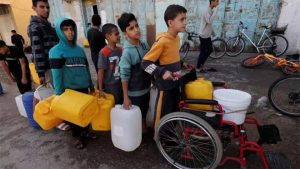Occupied Al-Quds, (ST) – Thirst has been deadly weapon used by the Israeli occupation in its war against the Palestinian people.
After stealing the land, the occupation seized the surface and groundwater sources, and year after year it reduced the amounts of water that reach the West Bank, while preventing its people from digging wells using this policy as a weapon to displace the Palestinians and complete its settlement building plan.
Since the first days of its aggression against Gaza Strip last October, the occupation has used thirst alongside missiles and bombs to kill 2.4 million Palestinians.
On October 9, the Minister of War in the occupation government, Yoav Galant announced the imposition of a complete siege on the Strip and said: No electricity, no food, no water, no fuel, everything is closed. “We are fighting human animals and we act accordingly”, he said.
 After more than eight months of aggression, the people of Gaza Strip are suffering from a severe water crisis, due to the destruction of pumping stations and water networks and the prevention of the entry of fuel to operate desalination plants and wells.
After more than eight months of aggression, the people of Gaza Strip are suffering from a severe water crisis, due to the destruction of pumping stations and water networks and the prevention of the entry of fuel to operate desalination plants and wells.
The report indicated that the average daily Palestinian water consumption in the West Bank is 86.4 liters, and in Gaza Strip it was 84.6 liters before the aggression.
It indicated that if the high level of water pollution in Gaza Strip is taken into consideration and the quantities of water suitable for human use are calculated from the available quantities, the individual’s share of fresh water will drop to only 20.5 liters per day, which is less than the minimum rate recommended globally, that is estimated at 100 liters per day according to the standards of the World Health Organization (WHO), and much lower than the average consumption of the Israeli settler, which is three times higher than the Palestinian, as the share of each settler is about 300 liters per day.
 In a procedure that is repeated annually with the onset of summer, the occupation authorities reduced the amount of water allocated to the city of Ramallah in the West Bank by about 50 percent a few days ago, and reduced the amount allocated to Hebron and Bethlehem by about 35 percent.
In a procedure that is repeated annually with the onset of summer, the occupation authorities reduced the amount of water allocated to the city of Ramallah in the West Bank by about 50 percent a few days ago, and reduced the amount allocated to Hebron and Bethlehem by about 35 percent.
This matter created a major crisis with the rise in temperature and the Palestinians’ food security in a bid by the occupation to undermine the steadfastness of the Palestinian people on their land.
The Head of the Palestinian Water Authority Mazen Ghoneim said in a statement to Wafa News Agency: The occupation’s reduction of the amount of water reaching the West Bank, and the water blockade it imposes on its cities and towns comes within the framework of its war on the Palestinian presence.
He pointed out that this blockade has escalated in the last four years, as there has been more restriction and expansion of settlements and the theft of water resources for their benefit at the expense of the Palestinians, whom the occupation is suffocating in narrow areas to complete its plan of displacement and annexation of the West Bank.
Ghneim also said that the occupation’s fragmentation of the West Bank, the barriers it has set up there, the scarcity of available water, and the prevention of drilling wells prevent Palestinians from finding any solutions to the water crisis.
He stressed that the only solution lies in ending the occupation and establishing an independent Palestinian state capable of investing all its resources.
 For its part, the Al-Khalil (Hebron) Municipality indicated that the occupation’s main goal in reducing the quantities of water coming to this city and Bethlehem is to increase the settlers’ share of water at the expense of the Palestinians.
For its part, the Al-Khalil (Hebron) Municipality indicated that the occupation’s main goal in reducing the quantities of water coming to this city and Bethlehem is to increase the settlers’ share of water at the expense of the Palestinians.
The Municipality called on the international community and human rights institutions to urgently intervene to solve the water crisis in the southern West Bank. It warned that the exacerbation of the crisis at this time will double the suffering of the Palestinians and deprive them of their most basic rights to obtain water, the quantities of which do not normally reach the level required for the individual’s share.
Raghda Sawas

